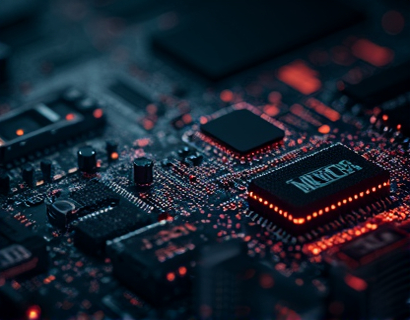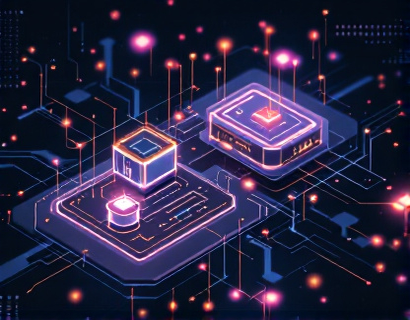Maximizing Productivity in the Digital Age: Leveraging Crypto and AI for Enhanced Solutions
In the rapidly evolving digital landscape, productivity has become a critical factor for success. The integration of cutting-edge technologies such as cryptocurrency and artificial intelligence (AI) offers unprecedented opportunities to enhance efficiency and innovation. This article delves into the transformative power of these technologies, providing a comprehensive guide to the latest tools and applications that can significantly boost digital productivity. Whether you are a tech professional or an enthusiast, understanding and leveraging these advancements can place you at the forefront of the digital revolution.
Understanding Cryptocurrency and Its Role in Productivity
Cryptocurrency, often associated with financial transactions, extends its utility far beyond mere currency. In the context of productivity, cryptocurrencies and blockchain technology offer secure, decentralized, and transparent solutions for various business processes. Smart contracts, for instance, automate and enforce contractual obligations without the need for intermediaries, reducing administrative overhead and minimizing the risk of fraud. This automation not only speeds up processes but also ensures higher accuracy and reliability.
Moreover, cryptocurrencies facilitate seamless and borderless transactions, making it easier for global teams to collaborate and exchange value. The use of digital wallets and cryptocurrency exchanges simplifies the management of funds, allowing for quick and secure transfers. For businesses operating in multiple regions, this can significantly reduce transaction costs and delays, thereby enhancing overall productivity.
AI: The Catalyst for Intelligent Automation
Artificial intelligence, on the other hand, is revolutionizing the way we approach tasks and workflows. AI technologies, including machine learning, natural language processing, and computer vision, enable machines to perform tasks that traditionally required human intervention. In the realm of productivity, AI-driven tools can automate repetitive and time-consuming tasks, freeing up valuable time for more strategic and creative work.
For example, AI-powered virtual assistants can manage schedules, send reminders, and even draft emails, reducing the cognitive load on individuals. Advanced analytics tools leverage AI to process and interpret large datasets, providing actionable insights that can inform decision-making and optimize operations. These capabilities not only increase efficiency but also foster a more innovative and agile work environment.
Combining Crypto and AI for Synergistic Benefits
The true potential of maximizing productivity in the digital age emerges when cryptocurrency and AI are combined. The decentralized and secure nature of blockchain, coupled with the intelligent automation capabilities of AI, creates a powerful synergy. One notable application is the development of decentralized applications (dApps) that utilize AI to enhance user experiences and operational efficiency.
dApps can leverage AI to provide personalized recommendations, predictive analytics, and real-time data processing, all while benefiting from the security and transparency of blockchain. This combination ensures that user data is protected and that transactions are immutable, fostering trust and reliability. For businesses, this means more robust and secure platforms that can drive customer engagement and satisfaction.
Tools and Applications for Enhanced Productivity
Several tools and applications are already harnessing the power of cryptocurrency and AI to boost productivity. Here are some key examples:
- Decentralized Storage Solutions: Platforms like IPFS (InterPlanetary File System) use blockchain to create a decentralized file storage network. This not only ensures data integrity and security but also reduces reliance on centralized servers, leading to faster and more reliable file access.
- AI-Driven Project Management Tools: Tools like Asana and Trello are integrating AI to offer smarter task management. AI can predict project timelines, identify bottlenecks, and suggest optimizations, helping teams stay on track and meet deadlines more effectively.
- Crypto-Powered Collaboration Platforms: Platforms such as Mina Protocol combine blockchain and AI to create lightweight, scalable networks for collaboration. These platforms ensure secure and efficient communication and file sharing, essential for remote and distributed teams.
- Automated Financial Management: Tools like Mint and Personal Capital use AI to manage personal finances, including budgeting, expense tracking, and investment advice. When integrated with cryptocurrency wallets, these tools can also manage crypto assets, providing a comprehensive financial management solution.
- Smart Inventory Management: AI algorithms can predict demand and optimize inventory levels, reducing waste and ensuring that resources are used efficiently. When combined with blockchain, this system can track the provenance and movement of goods, enhancing transparency and trust in supply chains.
These tools and applications demonstrate the practical applications of crypto and AI in enhancing productivity. By automating routine tasks, securing data, and providing actionable insights, they enable individuals and organizations to focus on higher-value activities that drive growth and innovation.
Challenges and Considerations
While the potential benefits are significant, there are also challenges and considerations to keep in mind when leveraging cryptocurrency and AI for productivity:
First, the complexity of these technologies can be a barrier to entry. Understanding blockchain and AI requires a certain level of technical knowledge, which not everyone possesses. However, as these technologies mature, user-friendly tools and platforms are emerging to make them more accessible.
Second, security remains a paramount concern. While blockchain is inherently secure, the integration of AI and cryptocurrency systems must be carefully designed to prevent vulnerabilities. Regular audits and adherence to best practices are essential to maintaining the integrity of these systems.
Third, regulatory considerations cannot be overlooked. The landscape of cryptocurrency regulations is still evolving, and businesses must stay informed about compliance requirements. AI, too, is subject to regulations, particularly in areas like data privacy and ethical use. Navigating these regulations is crucial to avoid legal issues and maintain trust.
Future Trends and Opportunities
The intersection of cryptocurrency and AI is a rapidly growing field, with numerous future trends and opportunities on the horizon. One significant trend is the rise of decentralized finance (DeFi), which uses blockchain to create financial systems that are open, transparent, and accessible to everyone. DeFi platforms can offer innovative solutions for lending, borrowing, and trading, all while leveraging AI for risk assessment and portfolio management.
Another area of growth is the development of AI-powered virtual and augmented reality (VR/AR) applications. These technologies, when combined with blockchain, can create immersive and secure environments for collaboration, training, and entertainment. The potential for enhanced user experiences and new business models is vast.
Furthermore, the integration of IoT (Internet of Things) with blockchain and AI is set to transform industries such as manufacturing, healthcare, and smart cities. Decentralized IoT networks can ensure secure and efficient data exchange, while AI can optimize operations and predict maintenance needs, leading to significant productivity gains.
Conclusion
In conclusion, the combination of cryptocurrency and AI offers a powerful toolkit for maximizing digital productivity. By automating routine tasks, securing data, and providing intelligent insights, these technologies can help individuals and organizations streamline operations and focus on innovation. As the digital landscape continues to evolve, embracing these advancements will be essential for staying competitive and achieving success. Whether you are a tech professional or an enthusiast, exploring and leveraging these tools can open up new possibilities and drive meaningful progress.










































